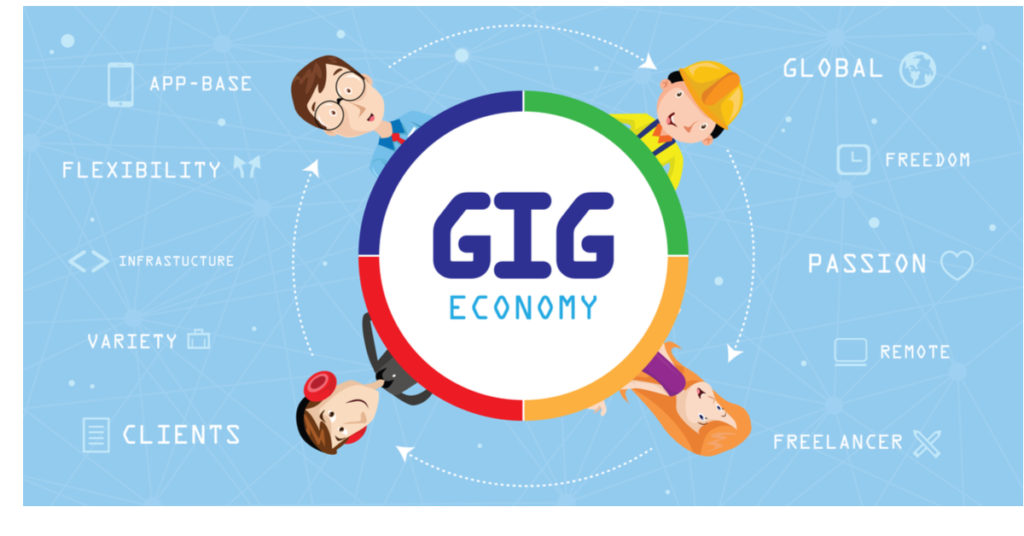
- Products
- Solutions
- Learn
- Partner
- Try Now
How gig workers can be the future of the workforce? Gig workers are those who take up hourly or temporary job positions in everything, from software development to graphic designing. There are numerous ways people can get involved in it – as individual contractors, freelancers, and part-time employees.
The gig economy system bodes well for both parties – employers can pick from a broader pool of talent (domestic or international) and rope in the suitable individual for a single project. The employees also get to select the projects they are intrigued by, and organisations that fit their idea of a convenient working environment. Moreover, they are in charge of their own schedule.
Gig Workers – Ally in Disguise for Businesses
Earlier, we only thought of music artists as looking for the next “gig.” Now, many individuals are going freelance and joining the gig economy against the conventional work environment.
Also, the gig economy has enabled people to start working at the earliest, making progress in areas that would have previously required significant effort to enter. This is the case with primary accommodation apps such as Airbnb in the lodging sector, and ride-sharing apps such as Lyft and Uber in the taxi service sector.
With restricted resources and budgets, small-scale companies lack the capability to employ full-time employees on contracts. With the gig economy, they can outsource jobs and tasks, as and when they need. This offers the companies greater flexibility and freedom and brings in new ideas and skills, which is crucial for driving businesses, economies, and innovation.
Gig workers already represent over 36% of the American workforce, which is nearly 59 million American adults. And labour trends at businesses opine that the gig economy has enough room to expand – 2/3 of tier-1 organisations are leveraging freelance contracts to reduce their labour expenses.
While the largest organisations are already in the ideal position to afford talent, small and medium-sized enterprises (SME) are all but sure to keep up the gig workers future workforce.

A Much-needed Change in Workspaces
The number of gig workers is constantly climbing, and this figure is anticipated to surpass 90 million by 2028. With these stats, we cannot deny the fact that the gig economy is shaping the future workplace.
But how exactly is the gig economy transforming the workspace? Scroll down to know more.
- Bridge the Gaps
Various businesses have been downsizing due to financial troubles amidst the COVID-19 pandemic. This has put a strain on consumers who might need those services and products. The gig economy will help fill in those gaps.
- Cut Down on Expenses
Recruiting gig workers helps businesses cut corners. Employee benefits such as paid leaves, insurance, and retirement plans amount to thousands of dollars annually.
Indeed, a recent report has revealed that employee benefits account for 32% of a worker’s compensation. By on-boarding gig workers, companies can cut these expenses by over 50% and reinvest the money saved in their businesses.
Moreover, businesses that team up with freelancers can save money on infrastructure costs. They do not need to maintain workspace, systems, and other office supplies. Organisations that have, or are looking to completely embrace remote work, can ward off the need for workspaces.
- Any time, any Task
The flexible work schedule of gig workers and their easy availability make them a great asset for businesses. One important thing to observe is that these workers are always up for work and can easily fit in when a company needs them whenever there is an additional workload on the existing workforce.
- No Training Required
As the gig workers already have work experience and a strong grip over different skills, they do not need training. They are already proficient in their fields and have their share of innovative ideas on completing the task.
Once the management elaborates the project requirements to them, they can swiftly adapt to the situation and work without any hassle.
How is Gig Economy Changing the Workspace?

People are increasingly shifting towards the gig economy, as it offers employment to a broader pool of candidates; thus creating a significantly large pool of talented individuals with different skill-sets.
With such a plethora of diverse candidates at their disposal, businesses can engage with them according to the requirements and make the best use of the gig economy.
Furthermore, the gig economy offers businesses the freedom to rope in a suitable candidate for the job. Employers can apply specific skill-sets to various areas of their businesses. For example, they can recruit gig workers to work on their SEO (Search Engine Optimisation), develop their website, or even manage their social media handles.
As such, businesses do not have to assign any tasks to their employees which are not employee’s forte. The gig economy enables companies to use different individuals who can play to their proficiency, allowing them to work as an established enterprise without any overhead expenses.
Pros and Cons of Being a Gig Worker
Like every choice in life, nothing is black and white, and planning to enter the gig ecosystem means understanding both sides of the coin to figure out if it is right for you.
Pros
- Make Your Own Hours
Working on different gigs lets you have the freedom and flexibility that routine 9-5 jobs cannot provide. If you want to take Thursday off to go out with your friends or get off early enough if you are down, the gig economy offers this liberty. You have the comfort to set your location, timing, and in some cases, prices.
- Take up Only the Jobs You Like

The gig economy offers flexibility, as well as a job choice. As you set your timetable, you have greater liberty to accept only the tasks you want. Perhaps, you are not in a position to be choosy; however, if you do not feel content and comfortable working for someone, you can always step back.
- Earn Money on Your Terms
Many gig workers prefer to become full-time, and others use part-time gig jobs as a side income. Wherever you land in the gig economy, you still have the capability to make cash on your terms. As per the type of job you do, you can define your commercials for your services, and craft the details of your temp contract. Your earnings are more in your control.
- Be Your Own Boss
Nobody wants to be ordered about what to do all day. One of the key benefits of being a gig worker is the ability to be your own boss. Certainly, you need to follow the guidelines of your present client or manager during the project; however, you only have to address yourself in the end.
Cons
- Income Goes Up and Down
One month you are loaded with projects and the next a long dry spell. You can go through long or short periods without a paycheck as a gig worker. If you are full-time, you have a stable income, making budgeting relatively easier.
- No Employee Benefits
Most gig workers do not get paid when they are not working, so if you plan to go on a vacation, you have to plan to ensure that you work enough hours. Also, you have to ensure that you buy your health coverage and save money for retirement.
- Burnout and Exhaustion
Getting involved in the gig economy might lead to burnout and exhaustion. You might end up working twice as much as you are supposed to. The fear of losing the gig, or worrying about having enough earnings the following month might compel you to undertake more work than you can manage.
What the Future Holds for the Gig Economy?
With growth comes change, and the gig economy is about to undergo more of it than the conventional labour sector has in decades. And this could be a blessing for both businesses and employees.
As the world moves forward, the gig economy also keeps pace with the business ecosystem. Instead of seeing the gig workers as outcasts, people should see them as an ally in disguise that will come to the rescue whenever needed.
Businesses only have to know when and how to leverage such worthwhile resources to make the most of their availability and cultivate positive outcomes for the company.
Subscribe to stay ahead with the latest updates and entrepreneurial insights!

Subscribe to our newsletter
Get access to the latest industry & product insights.





















